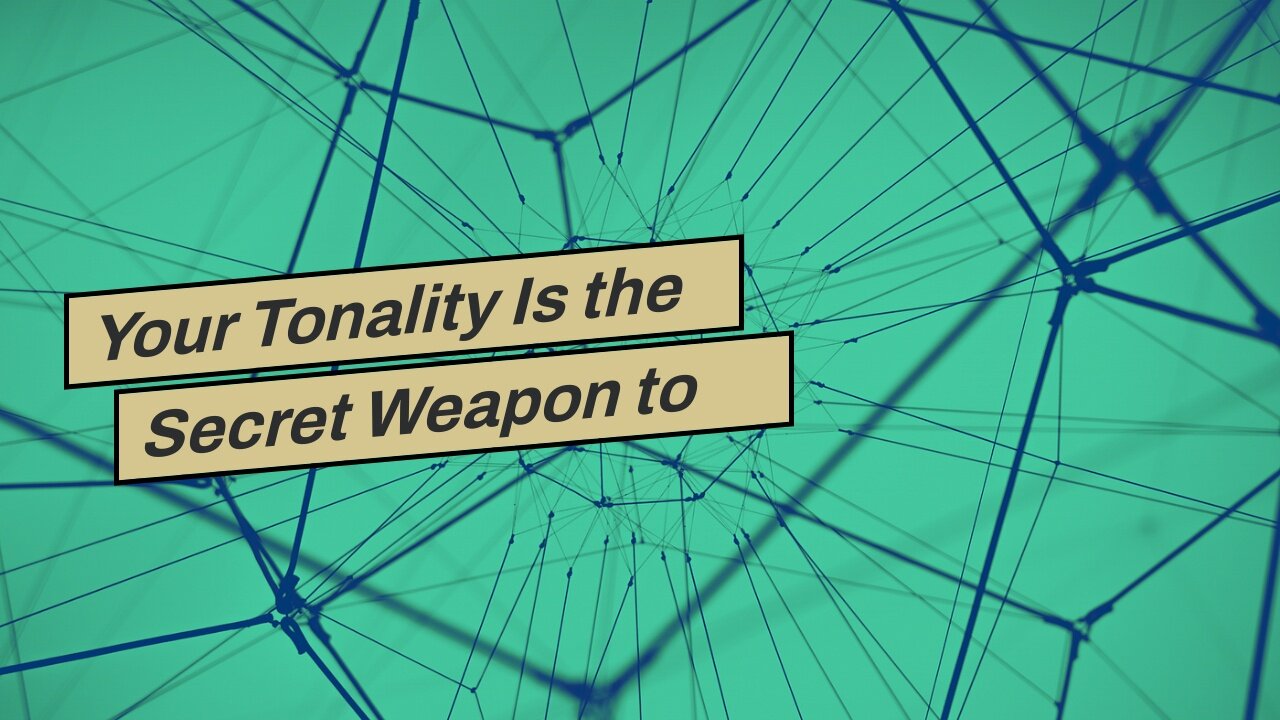Premium Only Content

Your Tonality Is the Secret Weapon to Better Sales Success
Your Tonality Is the Secret Weapon to Better Sales Success
Your voice can have a huge impact on your sales effectiveness. Sales reps tend to be focused on pitch perfection, but they don’t pay much attention to their tone of voice. It’s not surprising that tonality is often overlooked in a sales world. However, this doesn’t mean you can’t be mindful of how it is used. It doesn’t matter how you say it, but what you say is equally important. Many sales reps don’t know the value of tone because they don’t know how important it is to their sales success. Sales reps can begin to make conscious changes in...
Your voice can have a huge impact on your sales effectiveness. Sales reps tend to be focused on pitch perfection, but they don’t pay much attention to their tone of voice. It’s not surprising that tonality is often overlooked in a sales world. However, this doesn’t mean you can’t be mindful of how it is used. It doesn’t matter how you say it, but what you say is equally important. Many sales reps don’t know the value of tone because they don’t know how important it is to their sales success. Sales reps can begin to make conscious changes in their audio delivery if they become aware of the importance tonality plays for sales. This blog will provide examples and discuss the differences between tonality. What is Tonality? Tonality is simply the innations of how your voice sounds when speaking. It refers to the rise and fall or your voice. It is as simple as it sounds, but the right use of tone can make or break your sales pitch. Why is it important to have tonality in sales? Tonality is essential in sales, a field where sales representatives must present a compelling sales pitch. Your tone can either inspire and command attention or bore your audience. While most salespeople are motivated by an impressive script with persuasive words, Stanford research found that only 7% of people believe the words you speak. Over 90% of how people connect with you and whether or not they listen to your words is dependent on the sound you make. This includes your tone and body language. Truthfully, not everyone will remember what you said. But they will remember how it made them feel. The various components of Tonality Tonality is the art and science of effective communication. It is not just about the tone of your voice. However, that plays an important role. Tonality is complex. It involves many components such as volume, pitch and pace. This creates an effect that resonates far better than any one monotone delivery. It is important to have a customized framework that can be adjusted according to individual needs. Let’s take a closer look at each component: 1. Pitch Your pitch basically describes how loud or low you can speak. The pitch is a way of expressing your feelings and perceptions to others. While women tend to use a higher pitch than men, they are more likely to use it for their business pitches. However, sticking with the same pitch can make you seem boring and uninteresting. # A flat or monotone pitch is when your voice sounds monotonous and boring. It lacks innation and leaves listeners struggling with identifying if you are asking them a question, or making a statement. This causes them to lose focus on what they’re saying, which ultimately defeats the purpose of the pitch. You can watch the video Inflections can be used to keep the listener’s interest by bringing out the key words in the sentence. Roger Love, a world-renowned voice expert, has shown how small changes in pitch can make a big difference to people’s emotions. If you use notes that go up (from low-to-high), it gives you a feeling of joy and friendliness. Conversely, if you use notes that go down (from high to low), it creates a somber and sad tone. You can watch the video These are just a few examples of situations where you could use this technique. a. If you want to highlight important keywords in a sentence “The reason why I’m calling you is because we help sales reps increase their response rates using videos and I thought you might also be interested.” By increasing and decreasing your pitch at the right times, you subconsciously signal to them that the italicized words are important. b. Ask your listeners questions: Inflected upward pitch is used at...
-
 LIVE
LIVE
Darkhorse Podcast
3 hours agoThe 263rd Evolutionary Lens with Bret Weinstein and Heather Heying
942 watching -
 9:37
9:37
Silver Dragons
2 hours agoGoodbye Cheap Silver - How the Tariffs Will Change Stacking Forever
2.21K -
 37:33
37:33
CryptoWendyO
2 hours ago $0.47 earnedWORST DAY IN CRYPTO HISTORY $10 Billion in Liquidations!
5.65K7 -
 57:01
57:01
PMG
3 hours agoHannah Faulkner and Dr. Bryan Ardis | Don't Fall For the Bird Flu!!!
5.99K -
 1:18:00
1:18:00
Russell Brand
1 day agoUFOs, Whistleblowers, and Government Lies – The Truth with Jeremy Corbell – SF530
174K71 -
 1:57:47
1:57:47
The Charlie Kirk Show
4 hours agoThe Most Beautiful Word in English + Confirm Tulsi! | Navarro, McCain, Posobiec | 2.3.2025
169K53 -
 1:13:03
1:13:03
Michael Franzese
4 hours agoRATING Trump’s First Two Weeks In Office
43.4K22 -
 1:43:17
1:43:17
Benny Johnson
5 hours agoBREAKING: Mexico SURRENDERS To Trump, Locks Down Border | Mass FBI Firings, Deep State PURGE in DC
96.6K148 -
 1:01:48
1:01:48
Grant Stinchfield
4 hours ago $4.93 earnedTrump's Tariffs are Already Working... Here's Why...
38.5K12 -
 2:02:48
2:02:48
LFA TV
1 day agoTARIFF TRADE WAR! | LIVE FROM AMERICA 2.3.25 11am
80.1K74